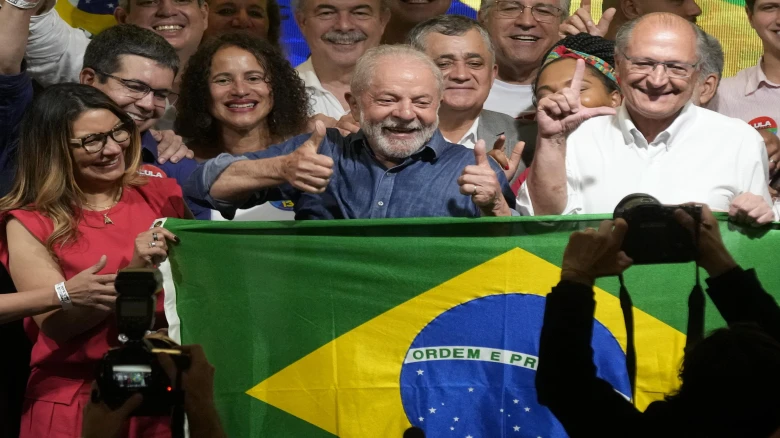Regional

He led significant labour protests against the military government in Brazil...
Digital Desk: Luiz Inácio Lula da Silva, the leftist leader popularly known as Lula, will serve a historic third term as President of Brazil. He defeated incumbent far-right President Jair Bolsonaro by a close margin of 50.90% to 49.10% as nearly all votes in the runoff election were counted on Sunday (October 30) night.
Lula was president of Brazil for two terms, from 2003 to 2006 and then again from 2007 to 2011, during which time the country had a tremendous commodities surge, which paid for massive social welfare programs that are credited with lifting millions out of poverty.
He is a strong leader with a well-known backstory: he could not read or write until the age of ten, and he had to stop studying after grade five because he needed to work full-time. He started working as a metalworker and was chosen as the union's leader in 1975. He led significant labour protests against the military government in Brazil, and in 1980, he helped create the Workers' Party (PT), which would later emerge as the primary leftist political force in the nation.
Lula entered Congress in 1986 and made many attempts to obtain the presidency, which he finally achieved in 2002. He earned a 90% approval rating when he left office at the end of 2010 since Brazilian law prohibits a third straight presidential term.
The following decade was difficult for Lula and turbulent for Brazil. Soon after leaving office, Lula was diagnosed with throat cancer, and his replacement, Dilma Rousseff, was impeached and removed from office in 2016. Lula was found guilty of corruption and money laundering the following year as a result of an investigation into the operations of Petrobras, the state-owned oil company.
Lula began serving a 12-year prison sentence in April 2018, a year before Bolsonaro took office. But in March 2021, the Supreme Court of Brazil reversed Lula's sentence, allowing him to rejoin politics after serving 580 days in jail.
Under Lula, India has had strong relations with Brazil. He came to India as the Chief Guest for the Republic Day parade in 2004, then again in 2007 and 2008, and he hosted then Prime Minister Manmohan Singh in 2006 and 2010, as well as President Pratibha Patil in 2008. Lula was president of Brazil when the inaugural BRIC (South Africa was not yet a member of the organization) meeting was held in Russia in 2009.
What is the importance of his victory?
The presidential election pitted Brazil's two most powerful leaders, who represent opposite ends of the political spectrum. President Bolsonaro was elected on a far-right platform, and he has since pushed forward with his agenda, which has been seen to have led to poor domestic management of the Covid-19 pandemic and reckless destruction of the Amazon rainforest, which has brought the world dangerously close to environmental catastrophe.
Brazil's economy has slowed down significantly over the last ten years. While Bolsonaro promised more deregulation and privatization, Lula has prioritized food and housing for the poor, especially those most affected by the virus.
Lula's victory highlights the significant turn to the left in Latin American politics. The transformation began with the victory of Andres Manuel Lopez Obrador in Mexico in 2018 and was followed by victories in 2019 for Alberto Fernandez in Argentina, Gabriel Boric in Chile, Pedro Castillo in Peru, and Gustavo Petro in Colombia. Following Lula's election, six of the region's largest economies will be led by Leftist politicians.
Still, Bolsonaro's defeat was narrow, and he remains a significant figure in the global movement of right-wing populism. Before the election, there were suspicions, fueled by Bolsonaro's own words, that if he lost, he would strive to undermine the integrity of the electoral process or reject the outcome entirely.
Leave A Comment